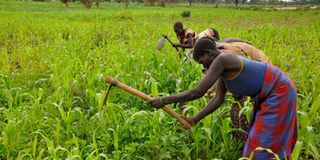Scientists’ challenge: To make research have a bigger impact at the grassroots

Farmers weeding a maize field in Karamoja. Innovations from research stations should be able to reach such farmers and be readily adapted by them. PHOTO BY STEPHEN OTAGE.
What you need to know:
It is not a new thought but this has been sounded in various fora. Research should make an impact at the grassroots.
Agricultural scientists have been challenged to develop new ways of getting their innovations from research institutes to the grassroots for greater impact in farming communities. It should be seen from communities around the national and zonal research institutes. This will facilitate faster adaption of technologies and other innovations.
This was the message that emerged during the second Biennial Scientific Conference, held November 3-7 in Kampala, and organised by National Agricultural Research Organisation (Naro).
Creating a change
With the theme “Connecting agricultural research to society”, the five-day conference was attended by national and international scientists, farmers, parliamentarians, policy-makers, and representatives from development partners and the private sector.
The conference was co-sponsored by Naro, ministry of Agriculture, Bioversity International, Science Foundation for Livelihoods and Development, CABI and Uganda Journal of Agricultural Sciences.
Dr John Bahana, a member of Naro’s Governing Council, who represented the chairman, observed that while agricultural research has come of age, the impact still eludes most farmers.
“Naro still has a challenge of impacting communities and spreading relevance of our research work across the country, especially creating a change in the low-yielding and poor-performing old crop, fish, animal and forestry or tree-technologies farmers still use. Change is also needed in farm management practices,” he said.
Encourage and engage
Agriculture minister Tress Bucyanayandi, while closing the conference, also observed that most of the good technologies developed by scientists have not reached the farmers.
“Technologies remain on the shelves, yet they should be used to solve issues that are raised as challenges, in conferences of this kind. The large body of public agricultural research institutes under Naro, universities and the private sector—all of them involved in research—should have caused a bigger impact than it has happened,” noted the Minister.
Bucyanayandi thus challenged Naro’s Governing Council, which comprises scientists and representatives of farmers and civil society, among others: “You should institute better coordination, communication and partnerships with stakeholders, like adopting farmer field schools to encourage and engage the youth in agriculture.”
Paradigm shift
On government’s part, he explained that restructuring and tackling management issues shall be an avenue to improve performance of the sector. “For instance, government’s decision to involve Uganda Prisons in seed production and multiplication, and Uganda Peoples Defence Force in distribution of agro inputs and monitoring, are steps in the right direction to avail high-quality planting materials and timely delivery.”
The minister also acknowledged that agricultural production has largely improved across the country, hence positively impacting food security and farmers’ incomes.
Bucyanayandi, was flanked by Dr Ambrose Agona, director general, Naro, and Dr Imelda Kashaija, deputy director general in-charge of technology promotion.
Across the board, there is general agreement that the need for a paradigm shift is required at the grassroots. Dr Joseph Kikafunda, a cereals breeder, and Jimmy Besigye, a farmer from Kigezi, both members of the Naro Governing Council, opined that the focus should be on mind-set change in farmers.
This should be along with organisational strategies like formation of farmers’ associations and cooperative societies. These would act as forums for change, and vehicles for information gathering and knowledge delivery.
Dr Kikafunda observed that it was high time scientific research became more relevant to ordinary people than remaining on a pedestal. “As long as we don’t deliberately inculcate the culture or spirit of looking to scientists for better technologies, which are widely available at research stations, we shall not see a huge improvement in production and productivity,” he said.
More participation
Besigye added: “The new strategy should be a multi-stakeholder, multi-institutional and multi-disciplinary action, which should be guided by well-documented studies and tested approaches.”
In all, the conference lived up to expectation, according to Dr Kashaija. There was more participation, and compared to the one held in 2012.
There were about 400 participants from Uganda, other African countries as well as beyond the continent. A total of 115 papers were presented under the three sub-themes, which included five keynote papers and 20 poster presentations.
The scientific conferences, held every two years, are the form of stakeholders’ forum that Naro is mandated to hold.
Best scientists awarded
Several best-performing scientists and emerging researchers received awards in the categories for oral and poster presentations and exhibitions. The best male oral presenter was Dr Onesmus Ssemalulu (NARL, Kawanda) while Dr Harriet Buyinza was best female oral presenter.
The second best male and female oral presenters were Dr Second Ogbologwung, from Nigeria, and Hellen Apio (Root Crops Programme-NaCRRI, Namulonge), respectively.
The best poster presentation was by Bwambale Mbirizi (NaFIRRI) while the second best poster presentation was won by Joyce Adokorach.
The best exhibitor was the Regional Universities’ Forum for African Capacity-Building in Agriculture (Ruforum), and the second-best exhibitor was Association for Strengthening Agricultural Research in Eastern and Central Africa (Asareca).
In best young male emerging scientist category: Vincent Ekiyar (NaCRRI) emerged top, while the best young female emerging scientist was Daphne Kamusingize.
All winners received their accolades from Tress Bucyanayandi, Minister of Agriculture, Animal Industry and Fisheries.




